|
Monday, October 28, 2013
|
|
8:00
|
Registration
|
|
8:30
|
Opening
Welcoming Remarks
Naoyuki Shinohara,
Deputy Managing Director, IMF

-
Kwesi Amissah-Arthur, Vice-President, Ghana
-
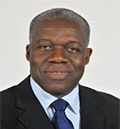 Mr. Kwesi Bekoe Amissah-Arthur , 63, holds a Bachelor
of Science Degree in 1974 and a Master of Science Degree in 1976, both in Economics
from the University of Ghana. He wrote his thesis on “Public Policy and economic
growth, a model of economic growth-Ghana” 1956-1974. Mr. Kwesi Bekoe Amissah-Arthur , 63, holds a Bachelor
of Science Degree in 1974 and a Master of Science Degree in 1976, both in Economics
from the University of Ghana. He wrote his thesis on “Public Policy and economic
growth, a model of economic growth-Ghana” 1956-1974.
He was appointed the Vice President of Ghana from September 2012. Prior to this
he was the Governor of the Bank of Ghana from 2009, and also a Deputy Minister for
Finance from 1997 in charge of the preparation of the Annual Public Investment Program,
Management of the budget of the Government of Ghana and managing the bilateral and
multilateral assistance to Ghana.
Mr. Amissah-Arthur lectured at the Department of Economics at the University of
Ghana between 1980 and 1988. Prior to this, he was a research assistant at the Institute
of Statistical, Social and Economic Research between 1974 and 1975. He later joined
the Economic Department of the University of Ghana as a teaching assistant from
1977 to 1978 going on to become an assistant lecturer in 1979. He was a lecturer
at the Department of Economics, Anambra State College of Education, Awka, Anambra
State, Nigeria between August 1981- July 1983).
Between 1983 and 1986, Amissah-Arthur served as a special assistant to the Provisional
National Defence Council (PNDC) Secretary of Finance and Economic Planning, Dr Kwesi
Botwey. He became Deputy Secretary for Finance in the PNDC government from February
1986 until March 1993. Mr Amissah-Arthur worked as a Consultant for the World Bank
in the Gambia and also served as a consultant for the Netherlands government Education
project in Ghana. Between 1988 and 2000, he worked as Senior Economist for the Sigma
One Corporation in Ghana and between 2001 and 2002 he was on assignment for the
Ministry of Foreign Affairs of Denmark.
He is married with two children.
|
|
9:00
|
Session 1: A Changing Financial Landscape in West Africa
The session describes the changing financial landscape in West Africa in the past
decade, highlighting the nature and magnitude of cross-border flows and the growing
importance of African financial groups. It identifies the main opportunities (increased
competition and access to financial services, economies of scale, financial innovation)
and challenges (cross-border supervision, consolidated supervision, regional capital
flows) arising from an increasingly dynamic and complex financial environment. The
session also looks at the factors behind the rise of regional financial hubs.
Chair:
-
Lamido Sanusi, , Governor, Central Bank of
Nigeria
-
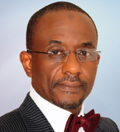 Sanusi Lamido Sanusi(CON) was born in Kano Northern
Nigeria, on July 31, 1961. He started his education at St. Anne’s Primary School
in Kakuri, Kaduna. He attended the prestigious King’s College, Lagos between 1973
and 1977, and went on to graduate with a Bachelor’s degree in Economics from the
Ahmadu Bello University in 1981. After his National Youth Service, Sanusi pursued
a Masters Degree programme in Development Economics and came out with a Distinction.
He also taught Economics at the Ahmadu Bello University between 1983 and 1985, and
then embarked on a banking career, starting at Icon Limited, Merchant Bankers, where,
over a period of seven years, he held a variety of roles spanning Corporate Finance,
Treasury Services, Credit and Marketing. He left the banking in 1991 as Area Manager
(Kano) for further studies and in 1997, he graduated with a First Class Degree in
Sharia and Islamic Studies from the International University of Africa, Khartoum,
Sudan, where he also studied Arabic. Sanusi Lamido Sanusi(CON) was born in Kano Northern
Nigeria, on July 31, 1961. He started his education at St. Anne’s Primary School
in Kakuri, Kaduna. He attended the prestigious King’s College, Lagos between 1973
and 1977, and went on to graduate with a Bachelor’s degree in Economics from the
Ahmadu Bello University in 1981. After his National Youth Service, Sanusi pursued
a Masters Degree programme in Development Economics and came out with a Distinction.
He also taught Economics at the Ahmadu Bello University between 1983 and 1985, and
then embarked on a banking career, starting at Icon Limited, Merchant Bankers, where,
over a period of seven years, he held a variety of roles spanning Corporate Finance,
Treasury Services, Credit and Marketing. He left the banking in 1991 as Area Manager
(Kano) for further studies and in 1997, he graduated with a First Class Degree in
Sharia and Islamic Studies from the International University of Africa, Khartoum,
Sudan, where he also studied Arabic.
Sanusi returned to banking in 1997, joining the newly privatized United Bank for
Africa (UBA) Plc as Principal Manager in the Credit Risk Management Division. By
March 2005, he had risen to the position of a General Manager, while building a
reputation as an expert on Risk Management. In September 2005, he was recruited
by First Bank of Nigeria Plc and appointed to the position of Executive Director,
Risk & Management Control. There, he would champion remarkable developments in the
bank’s enterprise risk and management control systems. As a member of the Board
and Executive Management, he displayed depth and capacity to make significant contributions,
with an eclectic knowledge base beyond his immediate areas of responsibility. In
January 2009, Sanusi was appointed to the position of Group Managing Director/Chief
Executive Officer of First Bank, but after only six months, he got a higher national
calling with his appointment as the 10th Governor of the Central Bank of Nigeria
(CBN) in June 2009.
Sanusi was appointed Governor in the middle of a global financial crisis with the
Banking system on the verge of collapse due to large exposure to the stock market
in the form of bubble capital and excessive margin lending by some banks, as well
as concentration of lending to other areas like petroleum marketing. Under his leadership,
the Central Bank of Nigeria moved swiftly and boldly to implement far-reaching reforms
in the Banking Industry aimed at addressing the root causes of the crises in poor
corporate governance and risk management practices, management fraud, insider abuses
and weak regulation supervision and enforcement. The Sanusi Reforms in the banking
and financial sector are anchored on four pillars:
- Enhancing the quality of banks;
- Establishing financial stability;
- Enabling healthy financial sector evolution; and
- Ensuring that the financial sector contributes to the real economy.
The first set of intervention occurred on August 14, 2009. The intervention was
based on the report of a joint audit exercise carried out by the Central Bank of
Nigeria and the Nigeria Deposit Insurance Corporation (NDIC) which revealed that
eight out of the twenty-four deposit money banks in the country were in a grave
situation leading to the removal of the Management of the affected banks by the
CBN and injection of N620 billion bail-out funds to stabilize the institutions.
Since that date, the CBN has issued guidelines and implemented new regulation as
policies. Among these are:
- Review of Prudential Guidelines to encourage lending to the real sector
- Compulsory adoption of common year ended for financial reporting and enhanced reporting
standards
- Compulsory retirement of CEOs who have spent upwards of 10 years in office
- Tenure limit of 12 years for non-executive directors enforced in line with guideline
issued in 2006
- Compulsory change of external auditors after ten years also as approved in 2006
- Abolition of Universal Banking and issuance of graduated authorization for licenses
of international nature and regional levels
- Spearheading real sector reform advocacy with government for power, petroleum, agriculture
and industry
- Enhanced coordination with other regulatory agencies in the capital market,(Securities
and Exchange Commission, SEC) pension administration (National Pension Commission,
PENCOM) and insurance (National Insurance Commission NAICOM, in order to institutionalize
overall system stability;
- Restoration of stability to the foreign exchange and money market, and
- the establishment of the Asset Management Company of Nigeria ,AMCON
Under Sanusi’ s able leadership, the CBN has ensured improved liquidity of commercial
banks, as bad loans to the manufacturing sector were refinanced. Similarly, the
sum of Non-Performing Loans (NPLs) was reduced from N 84.8 billion to N 22.97 billion.
In the same period under review, 13,886 new jobs have been created, just as 971,247
indirect jobs were generated.
Also under his leadership, the Bank has been able to put in place a robust monetary
policy framework for effective management of the macro economic variables. The Naira
(N) has enjoyed a very stable exchange rate in the last four years. The interventions
have seen inflation being brought under control. Since January 2013, Nigeria has
achieved a single digit inflation rate and also during the period Nigeria’s foreign
reserves has been built up and to date, Nigeria has the second largest reserves
in Africa which stands currently at $42b.
The key interventions in the real sector under the Sanusi Governorship include:
- The N200 Billion Refinancing/Restructuring of SME/Manufacturing Fund to refinance
and restructure bank’s existing loan portfolios to manufacturers in order to achieve
double digit growth rate.
- The N300 billion for long term funding of Power and Aviation sector at a concessionary
interest rate of 7% with a 10-15 year tenure. The intervention has assisted in the
resuscitation of the airline industry thereby preventing imminent collapse while
power projects financed by PAIF have a generating capacity of 647.6MW out of which
377.2MW was added to the economy.
- The N200billion Commercial Agricultural Credit Scheme (CACS) to finance large scale
projects along the agricultural value chain. The scheme is funded by a 7 –year Federal
Government bond being administered at a single digit interest rate of 9 percent
- The N200billion Small and Medium Enterprises (SME) Credit Guarantee Scheme (SMECGS)
to fast track the development of the manufacturing and SME sector of the Nigerian
economy by providing 80% guarantee on credit by banks.
- The Nigerian Incentive-Based Risk Sharing System for Agricultural Lending (NIRSAL).
The programme is a demand-driven credit facility that would build the capacity of
banks to engage and deliver loans for agriculture by providing technical assistance
and reducing counterpart risks. It also seeks to pool the current resources under
the CBN agricultural financing schemes into different components of the programme.
- The N220b Micro, Small and Medium Enterprises Fund was launched with 60% of the
fund dedicated to supporting women owned businesses.
- The establishment of Entrepreneurship Development Centres in the six geopolitical
zones in the country with the aim of building youth’s entrepreneurial spirit across
the country to enable them effectively contribute to the sustainable development
of the economy.
- As at august 2013, the EDCs had trained 41,441 youths, counseled 106,993 in business
management and created 10,895 new jobs while graduates accessed loans valued at
N220.04million to start their businesses from Deposit Money Banks and Micro Finance
Banks.
Other reforms initiated under the Sanusi Governorship at the CBN with salutary results
include:
- the cashless Nigeria policy;
- National Financial Inclusion Strategy (NFIS); and
- Improved investments in capacity building and process efficiency in the CBN.
As a prolific writer, Mallam Sanusi has written and presented numerous papers at
National and International conferences and seminars bordering on banking, politics,
religion and society. Many of his papers have been published in academic/professional
journals, books and newspapers around the world. He is aptly described by friends
and admirers as an accomplished intellectual and a mobile encyclopedia.
Mallam Sanusi was awarded the National Honour of Commander of the Order of the Niger
(CON) by His Excellency, President Goodluck Jonathan on July 22, 2010 and has been
admitted into the fellowship of the Chartered Institute of Bankers of Nigeria (CIBN).
Mallam Sanusi’s tough, decisive and transparent actions have earned him greater
and wider recognition, including a special invitation in November 2010, by the United
Sates Congressional Sub-Committee on International Monetary Policy and Trade, to
give testimony at a congressional hearing titled, “The Global Financial Crisis and
Financial Reforms in Nigeria”.
He has also been conferred the following honours and awards:
- 2012 Public Service Award by UNESCO Centre Abuja in June 2013
- 2012 Outstanding Career Service Award by Ahmadu Bello University, Zaria Alumni Association
Abuja June 2013
- 2013 Africa “Central Bank Governor of Year” award by IC Publications Group, in collaboration
with Business in AFRICS Events ,Marrakech ,Morrocco.
- Two time winner (2010 & 2011), Central Bank Governor of the Year for Sub-Saharan
Africa, by Emerging Markets – a publication of Euromoney
- 2011 TIME 100 Most Influential People in the World by the famous TIME magazine
- Honourary Doctorate Degree of Letters by the Bayero University, Kano on March 26,
2011
- Honourary Doctorate Degree in Law by the University of Jos, on 19th March, 2011
- Honourary Doctorate Degree in Business Administration by the University of Nigeria,
Nsukka, February 2011.
- Doctor of Science (D.Sc.), University of Benin, 2011
- Doctor of Science (D.Sc.), Benue State University, 2011
- Global/African Central Bank Governor of the Year 2011 by The Banker Magazine, a
Financial Times publication, January 2011.
- Silverbird Man of the Year 2010
- Tribune Newspapers Man of the Year 2010
- Vanguard Newspaper Man of the Year 2010
- Sardauna Leadership Award, 2010
- The Nation Newspaper Man of the Year 2009
- Leadership Newspaper Man of the Year 2009.
Mallam Sanusi comes from a family with a very long tradition of public service.
His father, Muhammad Aminu Sanusi, Ciroman Kano, was a technocrat and a career diplomat
who served as the Permanent Secretary of Federal Ministry of Foreign Affairs from
1975 to 1979 after serving as Nigerian Ambassador to Canada, Belgium and China and
a one-time Pro-Chancellor of the University of Jos from 1986 - 1993. Mallam Sanusi
is also the grandson of the 11th Emir of Kano and Islamic Scholar, Alhaji Sir Muhammadu
Sanusi KBE, CMG.
In recognition of his special status in the Kano royal family and contribution to
development of the Kano emirate and Nigeria he was conferred the prestigious royal
title of the Dan Majen Kano by His Highness Alhaji Ado Bayero, the Emir of Kano
on June 8 2012. Sanusi is married and blessed with children.
Presenter: Kal Wajid, Division Chief, African Department, IMF
Panelists:
1. Bolo Sanou, Secretary General, Banking Commission, Côte d’Ivoire
2. Abwaku Englama, Director-General, West African Monetary Institute, Ghana
3. Paul-Harry Aithnard, Head of Research, Ecobank, Ghana
Open Discussion
|
|
10:30
|
Coffee Break
|
|
11:00
|
Session 2: Cross-Border Banking Issues, Supervision and Regulation – Lessons from
International Experience
This session explores lessons from international experience of cross-border banking
for regulatory frameworks and supervisory practices. Cross-border banking poses
particular challenges for both home and host regulators and supervisors in their
work to preserve financial stability. Drawing on experience from other parts of
the world, the session will look into key aspects of effective supervision, such
as arrangements for information sharing, supervision of banking conglomerates, crisis
management, and burden sharing.
Opening address by José Viñals,
Financial Counsellor and Director, Monetary and Capital Markets Department, IMF
Chair:
-
Mamadou Diop, Vice Governor, BCEAO
-
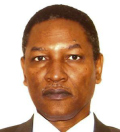 Mr. Mamadou Diop, is an economist by training.
After a period of time at a private bank, the International Bank for West Africa
(BIAO), in Niger, he spent most of his career at the Central Bank of West African
States (BCEAO). There he held senior executive positions, serving successively as
the National Director for Niger and as Director of the Issuance, Accounting and
Finance Department cumulatively with his functions as Special Advisor to the Governor. Mr. Mamadou Diop, is an economist by training.
After a period of time at a private bank, the International Bank for West Africa
(BIAO), in Niger, he spent most of his career at the Central Bank of West African
States (BCEAO). There he held senior executive positions, serving successively as
the National Director for Niger and as Director of the Issuance, Accounting and
Finance Department cumulatively with his functions as Special Advisor to the Governor.
He has also served as Secretary General of the West African Monetary Union (WAMU)
Banking Commission, supranational body responsible for the supervision of banks
and financial institutions in the WAMU Zone.
Given his long and abundant experience in monetary and financial affairs, Mr. Diop
was appointed, in September 2011, to the post of Deputy Governor of the BCEAO.
Panelists:
-
1.Agnes Martins, Director of Banking Supervision,Central
Bank of Nigeria
-
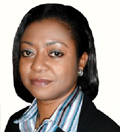 Agnes Olatokunbo Martins, was born on April 7th
Agnes Martins1963 in England, United Kingdom. She graduated with
a Bachelors degree in Economics from the University of Lagos in 1983. After her
National Youth Service Corps in 1984, she worked with the Federal Government Staff
Housing Board until 1990 when she joined the Central Bank of Nigeria. In 1997, she
obtained a Masters degree in Business Administration also from the University of
Lagos. In 2001, she proceeded to the London South Bank University, United Kingdom
to study Advanced Information Technology specialising in Object Oriented Analysis
and Design and graduating with a Distinction. At the same time, she obtained a second
bachelors degree in Applied Accounting with First Class Honours from the Oxford
Brookes University, also in the United Kingdom. Agnes Olatokunbo Martins, was born on April 7th
Agnes Martins1963 in England, United Kingdom. She graduated with
a Bachelors degree in Economics from the University of Lagos in 1983. After her
National Youth Service Corps in 1984, she worked with the Federal Government Staff
Housing Board until 1990 when she joined the Central Bank of Nigeria. In 1997, she
obtained a Masters degree in Business Administration also from the University of
Lagos. In 2001, she proceeded to the London South Bank University, United Kingdom
to study Advanced Information Technology specialising in Object Oriented Analysis
and Design and graduating with a Distinction. At the same time, she obtained a second
bachelors degree in Applied Accounting with First Class Honours from the Oxford
Brookes University, also in the United Kingdom.
Ms. Martins wrote the Certified Information Systems Auditor (CISA) exams of the
Information Systems Audit and Control Association (ISACA), USA in 2003 and qualified
as the third highest scorer in Nigeria. She is a fellow of the Institute of Chartered
Accountants of Nigeria (FCA), an Associate of the Association of Chartered Certified
Accountants (ACCA), an Associate of the Chartered Institute of Stockbrokers (ACS),
an Associate of the Chartered Institute of Taxation of Nigeria and a Stockbroker/Authorised
Clerk of the Nigerian Stock Exchange.
Ms. Martins worked for eighteen years as an Information Systems Auditor in the Internal
Audit Department of the Bank which culminated in her heading the Information Systems
Audit Division in Lagos. She has specific skills in auditing and security in Unix
Operating System environments which led to her becoming Certified in Information
Security Management (CISM) and Certified in Risk and Information Systems Controls
(CRISC). In 2009 she was transferred to the Other Financial Institutions Supervision
(OFIS) Department of the Central Bank of Nigeria, which is responsible for supervising
Microfinance Banks, Primary Mortgage Institutions, Development Finance Institutions
and Bureaux De Change.
She is the first female president of ISACA Lagos Chapter and was the only female
and African member on the respected European Computer Audit, Controls and Security
Task Force (EUROCACS) in 2010/ 2011. Her hobbies include reading, movies, music,
and travelling. She is married and blessed with children.
-
2. Christian Durand, Deputy Director General
for Economics and International Affairs, Banque de France
-
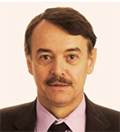 Christian Durand, was born on April 7th Christian
Durand, is currently deputy director general for economics and
international affairs at the Banque de France, Member of the CGFS. Mr. Durand has
held senior positions with the International Monetary Fund’s Monetary and Capital
Markets Department, the FIRST initiative, the French Banking Commission and the
French Securities and Futures Commission. He has worked extensively with financial
institutions in France and other organizations, including the New York Federal Reserve
Bank, the US Securities and Exchange Commission (SEC) and Commodity Futures Trading
Commission (CFTC), the U.K. FSA, the International Organization of Securities Commissions
(IOSCO) and the AFRITAC initiative. His academic training is in economics (thesis
on “the concept of money in the debates on capital, interest and fluctuations in
the early thirties”), finance and law. Christian Durand, was born on April 7th Christian
Durand, is currently deputy director general for economics and
international affairs at the Banque de France, Member of the CGFS. Mr. Durand has
held senior positions with the International Monetary Fund’s Monetary and Capital
Markets Department, the FIRST initiative, the French Banking Commission and the
French Securities and Futures Commission. He has worked extensively with financial
institutions in France and other organizations, including the New York Federal Reserve
Bank, the US Securities and Exchange Commission (SEC) and Commodity Futures Trading
Commission (CFTC), the U.K. FSA, the International Organization of Securities Commissions
(IOSCO) and the AFRITAC initiative. His academic training is in economics (thesis
on “the concept of money in the debates on capital, interest and fluctuations in
the early thirties”), finance and law.
Through his different assignments he has developed a professional experience in
central banking, international economics, financial supervision and financial sector
development and stability issues. He has led or supervised the implementation of
several technical assistance projects and conducted stability assessment missions
in a wide range of countries or monetary unions, including in the context of the
IMF/World Bank FSAP program.
3. Kweku Bedu-Addo, CEO, Standard Chartered Bank, Ghana
Open Discussion
|
|
12:30
|
Lunch
|
|
14:00
|
Session 3: Mobilization of Long-Term Financing for National and Regional Infrastructure
This session will bring together infrastructure finance practitioners and policymakers
to discuss options for infrastructure finance development in West Africa. It will
look at prerequisites to establish the enabling environments needed by developers,
investors, and financiers to mobilize long-term financing for national and regional
infrastructure projects. The session will focus on exploring specific measures required
to stimulate investors’ interest in infrastructure projects on the one side, while
also proposing concrete steps to develop customized financing solutions, crowding
in pension funds and other institutional investors.
Chair:
-
Seth Terkper, Minister of Finance, Ghana
-
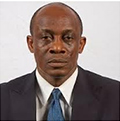 Mr. Seth Terkper, is a Chartered Accountant who
holds a Master of Public Administration (MPA) degree from the Kennedy School, Harvard
University, and a first degree in Bachelor of Commerce (B.Comm.) from the University
of Cape Coast (UCC) in Ghana. Mr. Seth Terkper, is a Chartered Accountant who
holds a Master of Public Administration (MPA) degree from the Kennedy School, Harvard
University, and a first degree in Bachelor of Commerce (B.Comm.) from the University
of Cape Coast (UCC) in Ghana.
He was appointed the Minister for Finance in January 2013 having served as the Deputy
Minister in the same Ministry from March 2009 to January 2013 working mainly on
the Budget and Medium-Term Expenditure Framework (MTEF) as well as on revenue policy
and administration. Before that, between July 1999 and February 2009, Mr. Terkper
held various positions (last as Senior Economist) in the Fiscal Affairs Dept. (FAD)
of the International Monetary Fund (IMF).
Before joining the IMF, Mr. Terkper worked in staff and management positions—including
National VAT Coordinator and Deputy Commissioner—in the National Revenue Secretariat
(MOFEP) and revenue agencies in Ghana. He played a key role in the introduction
of the Value Added Tax (VAT) in Ghana.
He consulted for the IMF; Harvard Institute for International Development (HIID),
Harvard International Tax Program (ITP); African Development Bank [AfDB], and UN
Committee of Tax Experts. He was a correspondent for Tax Analysts, USA.
In so doing, he worked with colleagues in the Tax Policy [TP] and other Divisions
in FAD; the African and Legal departments; the Caribbean Technical Assistance Centre
[CARTAC]; and other IMF units to achieve critical TA goals. As a chartered accountant
and public administrator, he follows fiscal, accounting, and other economic trends
closely.
He is a member of the Board of Directors of the Bank of Ghana (BOG) and chaired
the joint Steering Committee of the Ghana Revenue Authority (GRA) and Ghana Integrated
Financial Management Information System (GIFMIS) reforms.
Mr. Terkper has been part of—and participated in leadership positions in—local government
social, religious, and student bodies.
Mr. Terkper published a book on VAT (VAT Handbook by Thompson-Reuters) in 2011 and
continues to maintain a keen interest in research, publications, reviews and teaching.
He promotes a team effort and uses leadership and motivational skills to achieve
challenging goals.
Presenter:
-
Paul Noumba Um, Sector Manager, Financial and
Private Sector for West and Central Africa, World BanK
-
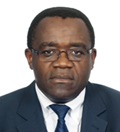 Paul Noumba-Um, is Sector Manager for Financial
and Private Sector Development for Western and Central Africa Unit in the World
Bank since 2010. He manages a portfolio of about $1 billion of projects across 23
countries in Western and Central Africa with a team of 35 professionals. His Unit
delivers lending and non lending activities in the area of financial and private
sector development - including flagship PPP projects in Nigeria and Ghana; a $300
million housing finance development project in Nigeria and Growth poles projects
in Burkina Faso, Democratic Republic of Congo and Senegal. Paul Noumba-Um, is Sector Manager for Financial
and Private Sector Development for Western and Central Africa Unit in the World
Bank since 2010. He manages a portfolio of about $1 billion of projects across 23
countries in Western and Central Africa with a team of 35 professionals. His Unit
delivers lending and non lending activities in the area of financial and private
sector development - including flagship PPP projects in Nigeria and Ghana; a $300
million housing finance development project in Nigeria and Growth poles projects
in Burkina Faso, Democratic Republic of Congo and Senegal.
Paul joined the World Bank in 1998 as a Policy Specialist in the then Global ICT
Department, a joint department of the IFC and the World Bank. Since, he has held
several positions including Program Manager of the Public-Private Partnerships in
Infrastructure Practice in the World Bank Institute from 2003 to 2007; and Lead
Economist in the Office of the Director of the Sustainable Development Department
in the Middle East and North Africa Region from 2007 to 2010. Prior to joining the
World Bank, Paul worked as a senior Economist in an Orange Labs in France and taught
regulatory economics at a French Grande Ecoles from 1992 to 1998. He also held the
position of Head of Economic Unit in the Ministry of Communications, while working
for the Cameroonian government from 1987 to 1992.
Paul is a native of Cameroon and holds a PhD in Economics and Masters in Engineering
and Economics from French Grandes Ecoles and Universities. He has contributed to
several books on Infrastructure Regulation and PPPs and published articles in peer
reviewed journals.
Panelists:
1. Yves Boudot, Directeur Afrique, AFD, France
-
2.Yu Wen, Deputy General Manager, China EXIM
Bank
-
Yu Wen joined China Eximbank in 2000, headquartered in Beijing.
The bank is a state bank solely owned by the Chinese government and under the direct
leadership of the State Council. Up to now, the Bank had 21 domestic business branches
and three overseas representative offices. It has established correspondent banking
relationship with more than 1,000 banks.
The Bank’s main mandate is to facilitate the export and import of Chinese mechanical
and electronic products, complete sets of equipment and new and high-tech products,
assist Chinese companies with comparative advantages in their offshore project contracting
and outbound investment, and promote international economic and trade cooperation
globally.
As Assistant General Manager in the Corporate Banking Department of the Bank, Yu
Wen works closely with Chinese enterprises for their transactions in Asia, Latin
America, Africa and Europe. She worked in a commercial bank and a foreign bank before
joining the Export and Import Bank of China.
-
3. Ato Gyasi Head of Infrastructure Financing,
RMB, Nigeria
-
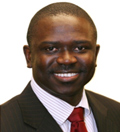 Ato Gyasi, has an extensive track-record in recourse
and limited/non-recourse financing and advisory of infrastructure-related assets
across Africa. His sector experience includes public private partnerships (power,
road, rail), telecommunications, industrials and export credit agency-backed transactions. Ato Gyasi, has an extensive track-record in recourse
and limited/non-recourse financing and advisory of infrastructure-related assets
across Africa. His sector experience includes public private partnerships (power,
road, rail), telecommunications, industrials and export credit agency-backed transactions.
Specific transactions he has been involved in include the expansion of Tema Port
in Ghana, the upgrade of Tongaat Hulett’s Sugar Mill in Mozambique, upgrade of various
roads in Tanzania, expansion of Ghana Grid Company's transmission network, the refinancing
of the Cahora Bassa Hydroelectric Dam in Mozambique, and the upgrade of Vodacom’s
network in Tanzania. Additionally, Ato has been involved in various award winning
transactions including, the Lekki-Epe Expressway toll road in Nigeria, Eskom’s Kusile
Power Plant in South Africa and the Angola Domestic Submarine Cable in Angola.
Ato Gyasi has a background in Civil Engineering and prior to joining RMB, spent
a number of years with a major South African construction firm and has design, construction
and project-management experience in various countries in Africa.
Open discussion
|
|
15:30
|
Coffee Break
|
|
16:00
|
Session 4: Roundtable Discussion: Lessons and the Way Forward
Moderator: Antoinette
Sayeh, Director, African Department, IMF
Panelists:
Participating Ministers of Finance
Open discussion
|
|
17:30
|
Concluding Remarks
Naoyuki Shinohara,
Deputy Managing Director, IMF
-
Kofi Wampah, Governor, Bank of Ghana
-
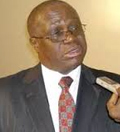 Dr. Henry Kofi Wampah, Governor of the Bank of
Ghana holds a PhD in Economics and a Masters degree from McGill University, Montreal,
Canada, having obtained a first degree in Economics and Statistics from the University
of Ghana in 1977. Prior to his appointment in April 2013, he was the 1st Deputy
Governor and Director for Bank of Ghana since April 16, 2009. Dr. Henry Kofi Wampah, Governor of the Bank of
Ghana holds a PhD in Economics and a Masters degree from McGill University, Montreal,
Canada, having obtained a first degree in Economics and Statistics from the University
of Ghana in 1977. Prior to his appointment in April 2013, he was the 1st Deputy
Governor and Director for Bank of Ghana since April 16, 2009.
Dr. Wampah started his working life at the Bank of Ghana in September 1986 as a
Deputy Manager of the Bank before he went on to become the Head of the Research
Department of the Bank. During this period he worked as a part-time staff with International
Monetary Fund, Washington, DC as a Special Appointee from May to December 1998 and
with the Monetary Operations Division of the Monetary and Exchange Affairs Department
and the Africa Department.
In 2001, he left the Bank for an appointment as Director of the Research and Statistics
Department at the West African Monetary Institute. At the institute he oversaw the
planning and implementation of the Macroeconomic Convergence monitoring programme
of the West African Monetary Zone.
He returned to the Bank of Ghana in April 2009 on his appointment as the first deputy
governor of the Bank of Ghana and then as Acting Governor until he was confirmed
as the substantive Governor in April 2013. He is currently the Chairman of Central
Bank Governors in West Africa where he he coordinates the activities of central
bank governors from five other countries namely Nigeria, Sierra Leone, Gambia, Liberia
and Guinea.
Dr. Wampah is married and has six children.
|
|
18:00
|
Joint Press Conference
|
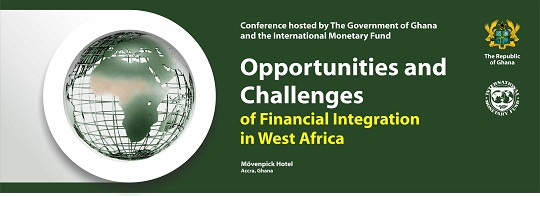



 Mr. Kwesi Bekoe Amissah-Arthur , 63, holds a Bachelor
of Science Degree in 1974 and a Master of Science Degree in 1976, both in Economics
from the University of Ghana. He wrote his thesis on “Public Policy and economic
growth, a model of economic growth-Ghana” 1956-1974.
Mr. Kwesi Bekoe Amissah-Arthur , 63, holds a Bachelor
of Science Degree in 1974 and a Master of Science Degree in 1976, both in Economics
from the University of Ghana. He wrote his thesis on “Public Policy and economic
growth, a model of economic growth-Ghana” 1956-1974. Sanusi Lamido Sanusi(CON) was born in Kano Northern
Nigeria, on July 31, 1961. He started his education at St. Anne’s Primary School
in Kakuri, Kaduna. He attended the prestigious King’s College, Lagos between 1973
and 1977, and went on to graduate with a Bachelor’s degree in Economics from the
Ahmadu Bello University in 1981. After his National Youth Service, Sanusi pursued
a Masters Degree programme in Development Economics and came out with a Distinction.
He also taught Economics at the Ahmadu Bello University between 1983 and 1985, and
then embarked on a banking career, starting at Icon Limited, Merchant Bankers, where,
over a period of seven years, he held a variety of roles spanning Corporate Finance,
Treasury Services, Credit and Marketing. He left the banking in 1991 as Area Manager
(Kano) for further studies and in 1997, he graduated with a First Class Degree in
Sharia and Islamic Studies from the International University of Africa, Khartoum,
Sudan, where he also studied Arabic.
Sanusi Lamido Sanusi(CON) was born in Kano Northern
Nigeria, on July 31, 1961. He started his education at St. Anne’s Primary School
in Kakuri, Kaduna. He attended the prestigious King’s College, Lagos between 1973
and 1977, and went on to graduate with a Bachelor’s degree in Economics from the
Ahmadu Bello University in 1981. After his National Youth Service, Sanusi pursued
a Masters Degree programme in Development Economics and came out with a Distinction.
He also taught Economics at the Ahmadu Bello University between 1983 and 1985, and
then embarked on a banking career, starting at Icon Limited, Merchant Bankers, where,
over a period of seven years, he held a variety of roles spanning Corporate Finance,
Treasury Services, Credit and Marketing. He left the banking in 1991 as Area Manager
(Kano) for further studies and in 1997, he graduated with a First Class Degree in
Sharia and Islamic Studies from the International University of Africa, Khartoum,
Sudan, where he also studied Arabic. Mr. Mamadou Diop, is an economist by training.
After a period of time at a private bank, the International Bank for West Africa
(BIAO), in Niger, he spent most of his career at the Central Bank of West African
States (BCEAO). There he held senior executive positions, serving successively as
the National Director for Niger and as Director of the Issuance, Accounting and
Finance Department cumulatively with his functions as Special Advisor to the Governor.
Mr. Mamadou Diop, is an economist by training.
After a period of time at a private bank, the International Bank for West Africa
(BIAO), in Niger, he spent most of his career at the Central Bank of West African
States (BCEAO). There he held senior executive positions, serving successively as
the National Director for Niger and as Director of the Issuance, Accounting and
Finance Department cumulatively with his functions as Special Advisor to the Governor. Agnes Olatokunbo Martins, was born on April 7th
Agnes Martins1963 in England, United Kingdom. She graduated with
a Bachelors degree in Economics from the University of Lagos in 1983. After her
National Youth Service Corps in 1984, she worked with the Federal Government Staff
Housing Board until 1990 when she joined the Central Bank of Nigeria. In 1997, she
obtained a Masters degree in Business Administration also from the University of
Lagos. In 2001, she proceeded to the London South Bank University, United Kingdom
to study Advanced Information Technology specialising in Object Oriented Analysis
and Design and graduating with a Distinction. At the same time, she obtained a second
bachelors degree in Applied Accounting with First Class Honours from the Oxford
Brookes University, also in the United Kingdom.
Agnes Olatokunbo Martins, was born on April 7th
Agnes Martins1963 in England, United Kingdom. She graduated with
a Bachelors degree in Economics from the University of Lagos in 1983. After her
National Youth Service Corps in 1984, she worked with the Federal Government Staff
Housing Board until 1990 when she joined the Central Bank of Nigeria. In 1997, she
obtained a Masters degree in Business Administration also from the University of
Lagos. In 2001, she proceeded to the London South Bank University, United Kingdom
to study Advanced Information Technology specialising in Object Oriented Analysis
and Design and graduating with a Distinction. At the same time, she obtained a second
bachelors degree in Applied Accounting with First Class Honours from the Oxford
Brookes University, also in the United Kingdom.
 Christian Durand, was born on April 7th Christian
Durand, is currently deputy director general for economics and
international affairs at the Banque de France, Member of the CGFS. Mr. Durand has
held senior positions with the International Monetary Fund’s Monetary and Capital
Markets Department, the FIRST initiative, the French Banking Commission and the
French Securities and Futures Commission. He has worked extensively with financial
institutions in France and other organizations, including the New York Federal Reserve
Bank, the US Securities and Exchange Commission (SEC) and Commodity Futures Trading
Commission (CFTC), the U.K. FSA, the International Organization of Securities Commissions
(IOSCO) and the AFRITAC initiative. His academic training is in economics (thesis
on “the concept of money in the debates on capital, interest and fluctuations in
the early thirties”), finance and law.
Christian Durand, was born on April 7th Christian
Durand, is currently deputy director general for economics and
international affairs at the Banque de France, Member of the CGFS. Mr. Durand has
held senior positions with the International Monetary Fund’s Monetary and Capital
Markets Department, the FIRST initiative, the French Banking Commission and the
French Securities and Futures Commission. He has worked extensively with financial
institutions in France and other organizations, including the New York Federal Reserve
Bank, the US Securities and Exchange Commission (SEC) and Commodity Futures Trading
Commission (CFTC), the U.K. FSA, the International Organization of Securities Commissions
(IOSCO) and the AFRITAC initiative. His academic training is in economics (thesis
on “the concept of money in the debates on capital, interest and fluctuations in
the early thirties”), finance and law.
 Mr. Seth Terkper, is a Chartered Accountant who
holds a Master of Public Administration (MPA) degree from the Kennedy School, Harvard
University, and a first degree in Bachelor of Commerce (B.Comm.) from the University
of Cape Coast (UCC) in Ghana.
Mr. Seth Terkper, is a Chartered Accountant who
holds a Master of Public Administration (MPA) degree from the Kennedy School, Harvard
University, and a first degree in Bachelor of Commerce (B.Comm.) from the University
of Cape Coast (UCC) in Ghana. Paul Noumba-Um, is Sector Manager for Financial
and Private Sector Development for Western and Central Africa Unit in the World
Bank since 2010. He manages a portfolio of about $1 billion of projects across 23
countries in Western and Central Africa with a team of 35 professionals. His Unit
delivers lending and non lending activities in the area of financial and private
sector development - including flagship PPP projects in Nigeria and Ghana; a $300
million housing finance development project in Nigeria and Growth poles projects
in Burkina Faso, Democratic Republic of Congo and Senegal.
Paul Noumba-Um, is Sector Manager for Financial
and Private Sector Development for Western and Central Africa Unit in the World
Bank since 2010. He manages a portfolio of about $1 billion of projects across 23
countries in Western and Central Africa with a team of 35 professionals. His Unit
delivers lending and non lending activities in the area of financial and private
sector development - including flagship PPP projects in Nigeria and Ghana; a $300
million housing finance development project in Nigeria and Growth poles projects
in Burkina Faso, Democratic Republic of Congo and Senegal.
 Ato Gyasi, has an extensive track-record in recourse
and limited/non-recourse financing and advisory of infrastructure-related assets
across Africa. His sector experience includes public private partnerships (power,
road, rail), telecommunications, industrials and export credit agency-backed transactions.
Ato Gyasi, has an extensive track-record in recourse
and limited/non-recourse financing and advisory of infrastructure-related assets
across Africa. His sector experience includes public private partnerships (power,
road, rail), telecommunications, industrials and export credit agency-backed transactions.
 Dr. Henry Kofi Wampah, Governor of the Bank of
Ghana holds a PhD in Economics and a Masters degree from McGill University, Montreal,
Canada, having obtained a first degree in Economics and Statistics from the University
of Ghana in 1977. Prior to his appointment in April 2013, he was the 1st Deputy
Governor and Director for Bank of Ghana since April 16, 2009.
Dr. Henry Kofi Wampah, Governor of the Bank of
Ghana holds a PhD in Economics and a Masters degree from McGill University, Montreal,
Canada, having obtained a first degree in Economics and Statistics from the University
of Ghana in 1977. Prior to his appointment in April 2013, he was the 1st Deputy
Governor and Director for Bank of Ghana since April 16, 2009.